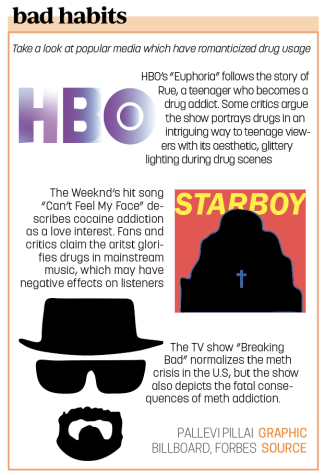Season 2 of the popular HBO series, “Euphoria,” premiered in January and continued into last month. The show follows a group of students through their normal high school life and sometimes shows how the use of drugs makes them feel euphoric. Emmy Award winner Zendaya plays the character Rue Bennett, a 17-year-old drug addict who goes into rehab and struggles with her sobriety. But while this show is popular among teens, there are mixed reviews when it comes to how drugs in the show have an influence on those who watch it.
This issue can be problematic. The series often demonstrates how drugs can make someone feel good without talking about the different negative effects drug use really has. To be fair it’s a difficult path for the show to take. Some, like the members of the Drug Abuse Resistance Education (D.A.R.E.) program, argue the show glorifies the drug use. Other groups say the show is doing a service by portraying the realities of what it’s like to be addicted to drugs and how to deal with addicts. Featuring drugs in shows can have both pros and cons. Regardless of whether the show does a good job, some teens who watch shows depicting drugs can easily be influenced. Seeing how the characters act on TV and being portrayed as “feeling good” could make teens want to experiment. Many teens are curious about drugs, and the shows can heavily excerbate that feeling.
On the other hand, actors in Euphoria have tried to discourage viewers from following in their characters’ footsteps. Zendaya herself issued a trigger warning via social media before the Season 2 premiere. Additionally, actors’ portrayals aren’t always rosy. They show the raw reality of what it can be like dealing with an addiction and how it can be for someone who deals with a loved one’s addiction. According to an article on the pop culture website Complex, “there is plenty that the drama is getting right about addiction and recovery…” In an article on Turn Bridge— an organization which works with teens who struggle with mental health abuse and substance abuse— the author said the truth about drug additction is very accurately portrayed in “Euphoria.”

That being said, it isn’t enough. As a teen myself, watching different shows with portrayals of drug use is like a constant reminder on why doing drugs is never the option. But to other teens, especially younger audiences, the portrayals may have a different effect depending on their situation. Different viewers digest these shows in different ways which is why providing a disclaimer about such shows is so important. But other measures can be taken. Shows like “Euphoria” could add an informative video at the beginning of each season with the actors and talk about why the portrayal of heavy drug use in the show is dangerous. The popular T.V. show, 13 Reasons Why did this as well as it covers the topic of suicide. They could also provide disclaimers at the end of each episode to share drug addiction help numbers for people who really may be struggling. Doing things like this can really help even a small amount.
Drug use, drug addiction and substance abuse has been displayed in shows for ages. But we have so many more outlets now to help combat the dangers of drug use. For that reason, while we can enjoy the show, it’s important to realize the negative effects media can have on drug perception.

































![AI in films like "The Brutalist" is convenient, but shouldn’t take priority [opinion]](https://hilite.org/wp-content/uploads/2025/02/catherine-cover-1200x471.jpg)








































![Review: “The Immortal Soul Salvage Yard:” A criminally underrated poetry collection [MUSE]](https://hilite.org/wp-content/uploads/2025/03/71cju6TvqmL._AC_UF10001000_QL80_.jpg)
![Review: "Dog Man" is Unapologetically Chaotic [MUSE]](https://hilite.org/wp-content/uploads/2025/03/dogman-1200x700.jpg)
![Review: "Ne Zha 2": The WeChat family reunion I didn’t know I needed [MUSE]](https://hilite.org/wp-content/uploads/2025/03/unnamed-4.png)
![Review in Print: Maripaz Villar brings a delightfully unique style to the world of WEBTOON [MUSE]](https://hilite.org/wp-content/uploads/2023/12/maripazcover-1200x960.jpg)
![Review: “The Sword of Kaigen” is a masterpiece [MUSE]](https://hilite.org/wp-content/uploads/2023/11/Screenshot-2023-11-26-201051.png)
![Review: Gateron Oil Kings, great linear switches, okay price [MUSE]](https://hilite.org/wp-content/uploads/2023/11/Screenshot-2023-11-26-200553.png)
![Review: “A Haunting in Venice” is a significant improvement from other Agatha Christie adaptations [MUSE]](https://hilite.org/wp-content/uploads/2023/11/e7ee2938a6d422669771bce6d8088521.jpg)
![Review: A Thanksgiving story from elementary school, still just as interesting [MUSE]](https://hilite.org/wp-content/uploads/2023/11/Screenshot-2023-11-26-195514-987x1200.png)
![Review: "When I Fly Towards You", cute, uplifting youth drama [MUSE]](https://hilite.org/wp-content/uploads/2023/09/When-I-Fly-Towards-You-Chinese-drama.png)
![Postcards from Muse: Hawaii Travel Diary [MUSE]](https://hilite.org/wp-content/uploads/2023/09/My-project-1-1200x1200.jpg)
![Review: "Ladybug & Cat Noir: The Movie," departure from original show [MUSE]](https://hilite.org/wp-content/uploads/2023/09/Ladybug__Cat_Noir_-_The_Movie_poster.jpg)
![Review in Print: "Hidden Love" is the cute, uplifting drama everyone needs [MUSE]](https://hilite.org/wp-content/uploads/2023/09/hiddenlovecover-e1693597208225-1030x1200.png)
![Review in Print: "Heartstopper" is the heartwarming queer romance we all need [MUSE]](https://hilite.org/wp-content/uploads/2023/08/museheartstoppercover-1200x654.png)



